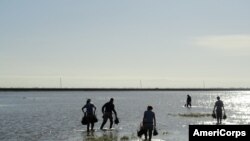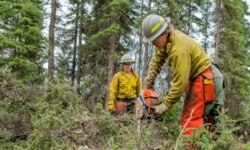Momentum is building among congressional Democrats to provide significant funding for the Civilian Climate Corps – an initiative originally proposed by President Joe Biden earlier this year as part of the American Jobs Plan.
The plan envisions a federal program that would hire young Americans to work on a wide variety of projects meant to remediate existing damage from climate change, to make at-risk areas of the country more resilient to climate change, and to help establish the kind of infrastructure that would allow renewable energy sources to be more thoroughly integrated into the U.S. economy.
If their plan comes to fruition, Democrats will insert at least $10 billion in funding for the new organization into what is expected to be a $3.5 trillion package that could be forced through Congress on a Democrats-only vote later this year.
A nod to FDR
Particularly in the early days of his presidency, Biden’s rollout of major proposals has invited comparisons to past Democratic presidents, including Franklin Delano Roosevelt and Lyndon Baines Johnson.
The proposal for a Civilian Climate Corps might be Biden’s most explicit callback to the days of FDR, echoing, as it does, the Civilian Conservation Corps founded in 1933. That version of the CCC was conceived as a jobs program, in the depths of the Great Depression, which would have the added benefit of creating projects of longstanding value to the country and its people.
Participation in the original CCC, however, was explicitly limited to men, and in many cases practically limited to white men. Advocates of the new CCC have made it plain that they expect any such program to be diverse in its membership and management.
Driver of diversity
Proponents of the new CCC see it as an organization that could partner with existing federal and state agencies to deliver manpower and resources to parts of the country where the need is greatest, while simultaneously offering opportunities to women and minorities in fields where they are underrepresented.
Scott Segerstrom, executive director of the Colorado Youth Corps Association, said that the kind of resources that the CCC could bring to bear in his state would be able to improve wildfire mitigation and prevention projects, and would help expand on the work that existing organization are already undertaking. One example, he said, is a program meant to draw a more diverse group of people into the work of wildland firefighting – typically an area dominated by white men.
“We have a program called the Women's Fire Corps, and it's exactly what it sounds like – a cohort of young women who are trained and get their first hands-on experience in a supportive, inclusive environment,” Segerstrom said. “And an outcome of that program is that we will see more young women entering the wildland firefighting sector. Our hope is over time that that sector better reflects the face of Colorado, and by extension, the face of America, and the Civilian Climate Corps is a mechanism that can grow programs like that.”
Broad Democratic support
On July 20, more than 80 Democratic members of the House and Senate sent a letter to the party’s congressional leadership, calling on them to include funding for the CCC in the package.
“The urgency of this moment recalls past chapters of national mobilization,” the letter said, nodding to the creation of both Roosevelt’s Civilian Conservation Corps, and AmeriCorps, which employs 75,000 Americans every year in various public service programs.
“In standing up the Civilian Climate Corps,” the lawmakers said, “we will build on that legacy and existing infrastructure, provide robust economic and educational opportunity, and promote inclusive and equitable Corps.”
Wide discrepancy over funding
While support for the CCC, in principle, is broad within the Democratic party, there is considerable divergence among members as to how much funding the program would require.
Democratic Oregon Sen. Ron Wyden and Colorado Rep. Joe Neguse, for example, claim that a bill they co-sponsored, which recommended a $9 billion appropriation for “21st Century Civilian Conservation Corps” served as the model for President Biden’s slightly larger $10 billion.
However, other Democrats are calling for an investment that is an order of magnitude larger. Democratic New York Rep. Alexandria Ocasio-Cortez has said that the minimum necessary for an effective CCC is $132 billion. That’s a figure that the Sunrise Movement, a grassroots climate organization active in the push for a new CCC, has also advocated.
Without committing to a specific figure, Senate Majority Leader Chuck Schumer has promised, “I will fight to get the biggest boldest CCC possible.”
Republicans dubious
Because it will likely be part of a much larger spending bill that receives only Democratic support, any funding for the CCC that passes will not have the imprimatur of a bipartisan agreement. But in discussing the proposal, some in the GOP suggested that it might not get much support even on its own.
“I’m concerned that Democrats are taking what could be a popular, bipartisan concept, and hijacking it with reckless spending and unneeded federal involvement,” Idaho Rep. Russ Fulcher said in a hearing on the CCC before the House Natural Resources Committee.
Like many Republicans, Fulcher said the creation of a new government entity made the effort unnecessarily complex.
“As an alternative to creating an entirely new Civilian Climate Corps, Congress can simply encourage public-private partnerships and allow the private sector to innovate and continue existing, successful corps programs,” he said.
Republican Rep. Bruce Westerman of Arkansas expressed similar concerns, saying, “The administration has yet to release its strategy for how the proposed Civilian Climate Corps will be implemented or how this new program will interact with existing corps or federal workforce programs.”
Westerman added, “We should avoid creating a new federal bureaucracy and instead focus on creating win-win solutions by leveraging private funding and targeting future corps work on important activities like rebuilding trails, addressing deferred maintenance and conducting active forest management projects.”







